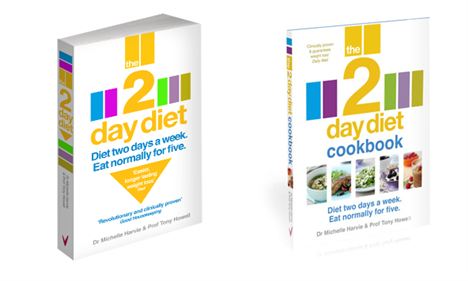DIET is an overused word in today's world. Everyone is on one, thinking about going on one, have just failed at one or, at least, has an opinion on one.
They're unavoidable. Whether you're wanting to look good in a bikini or doing it for the good of your health, at some point in your life you will go on a diet.
“The 5:2 diet and the 2-Day diet are not the same. The 5:2 diet is, in fact, a rip off of ours.”
Diet can, and is now clinically proven, to reduce the risk of cancer risk and Manchester charity Genesis has been at the forefront of the research. Looking particularly at those who are overweight and at a higher risk of breast cancer, dietitian Dr Michelle Harvie alongside Professor Tony Howell have created the 2-Day diet from the Genesis base at Wythenshawe Hospital.
This new diet has been proven to effectively lose weight and as a result, reduce the risk of breast cancer by up to 40 percent. Groundbreaking stuff.
So how did this preventative diet come about?
 2-Day diet and the 2-Day diet cookbook
2-Day diet and the 2-Day diet cookbook
“We started in 2003 and our research began with looking at ways of preventing breast cancer,” says Harvie. “We particularly looked at obese and overweight women at risk. If they lose the weight then they reduce the risk and obviously potential preventation is to be embraced.
“Most diets are difficult and there are few that are universally effective. In fact only 40 percent of those that diet are successful and even then it’s usually only for about six months or so. We just thought there must be a better way of doing it.”
Agreed.
Diets are never an easy thing to stick to and the diet industry is booming as people start and stop diets on almost a weekly basis. The weight loss market is expected to grow to £220 billion worldwide by the year 2017 and there are so many diets and variations available it can be tricky to know which to choose.
Harvie knows diets, and she knows in particular that strict calorie controlled ones can be tough to stick to long-term. A diet you only have to commit to for two days a week is perfect for those of us who find the prospect of a diet day-in and day-out a hard idea to stomach (so to speak).
“2006 was when we began researching specifically and compared the 2-Day diet with a daily diet. Animal research had proven that diets can reduce the risk of tumours and we combined this with existing American research that had proven an intermittent diet is just as effective as a daily diet. It’s also more manageable as it’s not every day.
 Dr Michelle Harvie"We started our study with allowing our testers to have 650 calories on the two days but only have milk, fruit and vegetables, We then allowed them to eat what they wanted on the other days as long as it was a healthy diet. Of course a diet of milk, fruit and vegetables is not that exciting and they got fed up. We could see the beneficial health effects but it was boring and people wouldn’t want to stick to it.
Dr Michelle Harvie"We started our study with allowing our testers to have 650 calories on the two days but only have milk, fruit and vegetables, We then allowed them to eat what they wanted on the other days as long as it was a healthy diet. Of course a diet of milk, fruit and vegetables is not that exciting and they got fed up. We could see the beneficial health effects but it was boring and people wouldn’t want to stick to it.
“By 2010 we had a 2-Day diet that was easier to follow. It’s a low carb diet for the two days and then healthy eating on the other five. Most people that have been on it found themselves restricting themselves to below 1500 calories on other days anyway."
Now I know what you're thinking, this 2-Day diet idea is hardly something new. There are many similar versions, the 5:2 and the 4:3 to name just two currently doing the rounds, but Harvie assures me they are not to be confused with the 2-Day diet.
“The 5:2 diet and the 2-Day diet are not the same," says Harvie. "The 5:2 diet is, in fact, a rip off of ours. There are around 130 books about the 5:2 diet at the moment. Ours is the only clinically proven diet that has been tested to show it’s beneficial.”
 2-Day diet chocolate and orange mousse
2-Day diet chocolate and orange mousse
“It’s not about counting calories but instead just eating low carbs, there’s no need to be hungry because you’re restricted to a number of calories per day. There are no rules with this diet other than to have two consecutive days of low carbs. Other diets give bad habits with rules and this is where people fall down and fail. With the 5:2 diet and similar versions people get this crazy idea that they can have what they want on other days.”
So, in summary: Low carbs on two consecutive days and healthy well-balanced meals on the other five. Obviously if you diet for two days and indulge yourself on the other five you're never going to see any results. But with steak, salmon and chocolate mousse still very much on the menu, the 2-Day diet is not as taxing as it would first appear.
So what else has Harvie been working on?
“Well, at Genesis we’re still doing more work with the 2-Day diet and all proceeds from book sales goes back into funding breast cancer research. We’re also currently doing a trial at the moment of how diet can help women going through chemotherapy, but that’s about a year and a half away from results. And we also want to do more research into exactly what happens to the body when people do diets.
“Ideally we want to see the 2-Day diet rolled out in the NHS in the future and more dietiticans to use it with obese and overweight patients.”
If you're going to choose a diet, it may as well be one that could save your life.
For more information on the 2-Day diet visit: www.thetwodaydiet.co.uk
And for more information about the work of Genesis: www.genesisuk.org
Follow Niamh Spence on Twitter.
2-Day diet menu example for a low-carb day
Breakfast
Greek yogurt with blackberries and cinnamon-toasted cashew nuts
Lunch
Mint, feta and soya bean salad
Dinner
Black pepper salmon with olives and tomatoes



